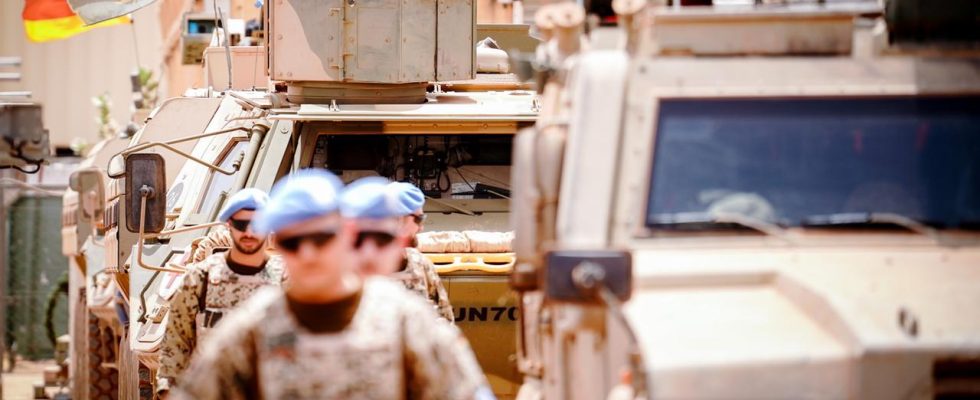So far, it was planned to withdraw the Bundeswehr from Mali at the end of May 2024. But preparations are also in place for the mission to end by the end of the year, as decided by the UN Security Council, says Defense Commissioner Högl.
The Bundeswehr is prepared to withdraw from Mali by the end of the year. The military commissioner Eva Högl assured after the decision of the UN Security Council to end the peacekeeping mission.
The German schedule has so far provided for the soldiers to withdraw by the end of May 2024. According to yesterday’s UN decision, all peacekeepers must now withdraw by the end of 2023.
“The Bundeswehr is prepared for this, especially since the relocation has been prepared for weeks and is already underway,” Högl told the editorial network Germany (RND). The SPD politician added that a new mandate from the Bundestag is unlikely to be necessary, “since the mandate already provides for flexible handling”.
Högl: Protection has top priority
The UN Security Council decided yesterday to end the MINUSMA mission in the West African country at the end of the year after a transitional period of six months. In mid-June, Mali’s military government demanded the withdrawal of all around 12,000 UN peacekeepers. The Bundeswehr is currently involved in the mission with around 1,100 soldiers.
According to Foreign Minister Annalena Baerbock, the end of MINUSMA is “bitter news for the people of Mali, to whom the mission gave protection and hope”. The Greens politician wrote on Twitter: “The Bundeswehr will now withdraw faster and in an orderly manner.” They wanted to continue to contribute to the security of the people in Mali, but the military government there made this increasingly impossible.
Högl emphasized that the protection of German soldiers, international forces and civilian employees has top priority: “Therefore, an orderly and safe withdrawal is needed in close coordination and together with our partners.”
Up to 2000 Russian Wagner Mercenaries
The UN mission to stabilize Mali has been running since 2013. It was launched after Islamist terrorists overran the north of the country in 2012 following the collapse of neighboring Libya and a rebellion by nomadic Tuareg. A military intervention by the former colonial power France pushed back the Islamists, some of whom were allied with the terrorist militias Islamic State and Al Qaeda, only temporarily. Since then, the terrorist groups have been spreading in the north and center of Mali and in its neighboring countries.
The military took power in the Sahel state in two coups in 2020 and 2021 and turned to Russia, which it hoped would provide more robust help against the Islamists. While the military junta only speaks of trainers, it is estimated that up to 2,000 Russian Wagner mercenaries are active in the country. France then ended its military operation.
Criticism of Foreign Minister Baerbock
The Union’s defense policy spokesman, Florian Hahn, described the UN decision as “a real embarrassment for the federal government, which is once again seen as being driven internationally”. “With the intention of artificially prolonging the mission, the federal government not only acted naively, but also irresponsibly towards our soldiers,” said the CSU politician to the “Augsburger Allgemeine”. It was foreseeable that reliable cooperation with the Malian military government would no longer be possible.
Above all, Hahn criticized Foreign Minister Baerbock. In Berlin, the Ministry of Defense had wanted to speed up negotiations within the government about the future course of the Bundeswehr in Mali. The Foreign Office reportedly argued against withdrawing from the UN mission. At the end of May, the Bundestag extended the mandate for participation for the last time, but also decided on a withdrawal mandate – with the target date at the end of May 2024. Hahn also criticized Defense Minister Boris Pistorius (SPD): “That Pistorius buckled in front of the Foreign Office and against better ones knowledge has not urged an earlier withdrawal is now distressing our soldiers.”
Kirby: Prigozhin engineered deduction
The head of the Wagner troupe, Yevgeny Prigozhin, has contributed to the termination of the UN mission in Mali, according to the United States. Prigozhin helped orchestrate the withdrawal of peacekeepers to further Wagner’s interests, US National Security Council communications director John Kirby said.
Wagner has been infiltrating African countries since 2016 and subverting their sovereignty, stealing their resources and killing their people, Kirby said. Despite the recent events – the Wagner uprising in Russia – there are no signs that the troops in Africa are weakening.
According to US information, the Malian interim government has paid Wagner around $200 million since the end of 2021, Kirby said. However, this did not lead to an improvement in the security situation. The role played by the mercenary force in Mali is “poisonous and deadly,” Kirby said. The sudden end of the UN mission will only exacerbate economic hardship, contribute to more internal and regional instability and move the country further from the goal of a democratic transition.

